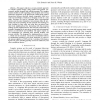Free Online Productivity Tools
i2Speak
i2Symbol
i2OCR
iTex2Img
iWeb2Print
iWeb2Shot
i2Type
iPdf2Split
iPdf2Merge
i2Bopomofo
i2Arabic
i2Style
i2Image
i2PDF
iLatex2Rtf
Sci2ools
112
Voted
CEC
2009
IEEE
2009
IEEE
Mobile processes, mobile channels and complex dynamic systems
— This paper explores a process-oriented approach to complex systems design, using massive fine-grained concurrency, mobile channels and mobile processes. The complex systems studied are self-organising, with emergent and evolving behaviours (apparent at the global level) arising from massive interactions between relatively simple components (that have only local knowledge). Classical ant foraging is used as a case study. Processes are used to represent space, environmental factors and the ants themselves. Ant processes (like all processes) only have knowledge of their internal state (looking for food, looking for their nest) and what they can glean from their local neighbourhood (by interacting with the processes making up that neighbourhood). The networks constructed are dynamic, changing as the ants move around and environmental factors are introduced and modified. The paper reports on two mechanisms for achieving this: channel mobility and process mobility. The language for imp...
Artificial Intelligence | CEC 2009 | Complex Systems | Environmental Factors | Massive fine-grained Concurrency |
Related Content
| Added | 20 May 2010 |
| Updated | 20 May 2010 |
| Type | Conference |
| Year | 2009 |
| Where | CEC |
| Authors | Eric Bonnici, Peter H. Welch |
Comments (0)

